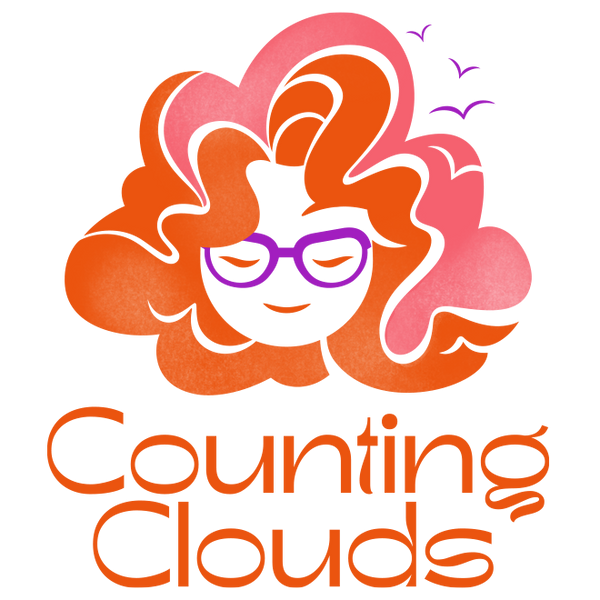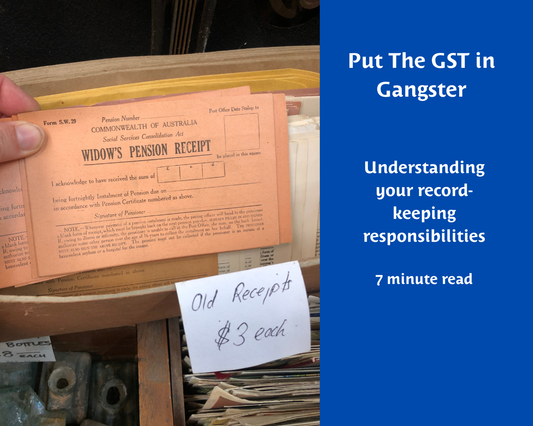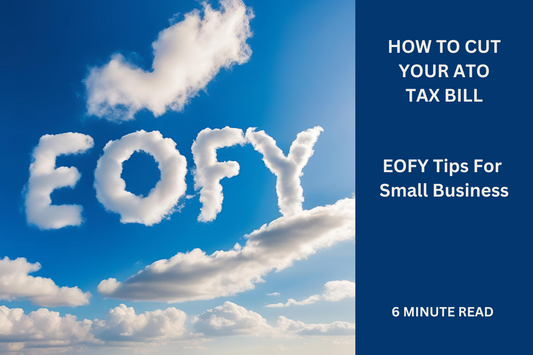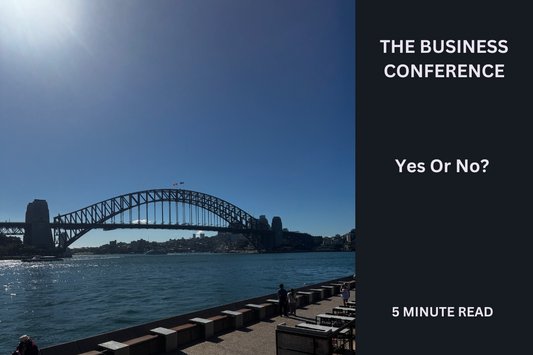The Counting Clouds Journey
Counting Clouds turned 10 in July 2024. With 60% of small businesses not continuing past 3 years, we see our 10th birthday as both an achievement and a prompt for reflection. Counting Clouds’ founder, Line Paras, takes us through the experiences and lessons of our journey thus far:
In my heart, I’ve always wanted to work with creatives. I feel they’re my people. When I dropped out of uni in 1998, I managed a cabaret bar on a boat in Nyhavn, Copenhagen and spent a lot of time with actors and musicians. After arriving in Australia, I worked in hospitality with many artists and also in jewellery making. Playing bass in The Gems, and being in Melbourne’s band scene, has been a big part of my life too.
The idea for Counting Clouds came to me in 2010 when I was working as a studio assistant and admin all-rounder for Melbourne bag designer and maker, Mattt. I was learning to use a brand new accounting program called Xero and flirting with paperless office solutions. I was also pregnant at the time, and was keen to find work that could be flexible, pay a living wage and not have me on my feet all day.
While on maternity leave, I undertook a Certificate 4 in Accounting & Bookkeeping. After that, I worked 3 part-time jobs, juggling motherhood and life in general. At that point, I already knew I was on the right path.
Working for a year as a music industry bookkeeper at White Sky was a brilliant stepping stone for me. I learned so much from the large team, and will be forever grateful for the connections I made.
In July 2014, I took the leap to start Counting Clouds as a sole trader. Before long, my days were full, working at Mannys Music, Taco Truck and Beatbox Kitchen.
I didn’t foresee that I’d be running a company, but that all changed when I met Christopher Boots in 2015. Taking on the bookkeeping for his industrial design company was a huge increase in workload. Luckily Bern, whom I’d met at White Sky, was ready to join me. We worked from studios, warehouses, co-working spaces, clients’ offices, cafes - Anywhere with decent wifi and hot drinks.
Our client list grew and grew, with The Design Files, Modern Times, Kester Black and several more iconic Melbourne businesses. We added 3 more staff members and moved into a small office above the Christopher Boots workshop. By 2018, we had more than 100 clients and the team had grown to 8. We had to stagger everyone's days in order to fit into our office!
By 2019, we’d grown so big that we needed workflow software. A client’s account being handled by just one bookkeeper wasn’t feasible anymore. We shifted to sharing work amongst the team according to skill level. Apart from being a better use of personnel, it ensured that in one staff member’s absence, responsibilities could be picked up by another so that the client wouldn’t be impacted.
Our boom around this time caught the attention of a firm that offered a partnership or buy out. It’s at these points on the small business rollercoaster that it pays to remind yourself why you started. Knowing your values, vision and mission helps with decision making. Mine had remained unchanged: I still valued the flexibility of the work and the creative community. I did consider the offer, but I’m so glad I chose to retain ownership and control.
That’s not to say that staying independent is always the right choice. If you have a wonderful opportunity, or your business is no longer feasible, or if you’re not enjoying it or it’s affecting your health, closing or selling can be the right step. There can be a feeling of being held captive by your business: You’ve invested so much effort, time and money, and might also have long-term liabilities. A good exit strategy though can minimise financial detriment and make a smooth transition to the next phase of your life.
But let me get back to 2019: In October, after much searching, I found a space on Brunswick Street where the team could spread out. Finally Counting Clouds had its own home.
A few months later, I started building a team in The Philippines. I’d resisted enticements from agencies to have offshore staff, wanting to keep everything local, but I was finding it difficult to find Australian staff who were at the right technical skill level and who were consistently available. Because my husband is Filipino, I have a strong connection to the country and its people. I checked with one of our cousins to make sure I wouldn’t be exploiting anyone. I’ve done it my way, hiring directly rather than through an agency. We’ve had our ‘Phils’ team ever since and they’re now integral to the business.
Then in March 2020, Covid hit. We were all banished to our homes but had to work harder than ever. Our clients desperately needed us to answer questions about their cash flow situations, and we needed to stay on top of the compliance obligations required for them to obtain funding. It was round after round of Jobkeeper lodgements and payments, grant applications, some clients going under, other clients pivoting, and everyone mentally struggling with isolation and uncertainty.
I’ve learned over the years that the ability to navigate crises is essential to staying in business over the long term. Whether it’s personal crises of your own or your employees or your clients, a global pandemic or recession, or changes to industries or the marketplace, you need to be able to roll with the punches.
In 2021, between the 3rd and 4th lockdowns, I gave up the office. It was hard for me to let it go, because it had been a dream of mine to have our own office, but it made sense. Most of the team enjoyed avoiding the daily commute, and with all our systems being in the cloud, we weren’t bound to a physical space. It’s a comforting memento though that the sign is still on the door at 406 Brunswick Street.
After having floating desks hosted by our friends, Nagle Accounting, we opted to take a small room in Collingwood Yards, within the space occupied by our clients, The Push Youth Music Organisation.
Post pandemic, in line with the global recovery, we had a huge influx of clients. We grew to a team of 20, and introduced a hierarchy of managers and bookkeepers, an operations manager and a technology expert. Soon, I was able to take myself ‘off the tools’ and be She-E-O. Expansion was exciting, but there was a nagging feeling that something wasn't quite right.
The truth is, we were so focused on growth that we lost sight of other things, like appropriate pricing and service models. I see now that growth for growth’s sake can be a trap. As the number of clients grew, so did the workload, and even our big, inflated team couldn’t keep up. It thrust us into a state of overwhelm. I knew I had to make some big changes.
I looked for an executive coach and found Eugene Wong from A Stronger Narrative. Every fortnight we would meet, and slowly but surely Eugene helped me make some tough decisions. To turn Counting Clouds into a sustainable business, we needed to adjust our prices, services and the way we packaged them.
In 2024, we’ve had to say goodbye to some clients who can't afford our new rates. It’s sad and disappointing when people leave. I favour relationships over money, which can sometimes contradict being in business. While I'm as passionate as ever about helping creative people with their accounts, I’ve learned that in order to help others, I need to have a profitable business.
Today, Counting Clouds is a leaner operation with our most powerful automation software to date. Our office is a 2-bedroom apartment in North Fitzroy and it suits us fine! All but 2 of us work from home, and there’s space for meetings when we need it.
This year I was able to take long service leave. It was a milestone for me and a test for the business, which it passed! On my way around Asia, I stopped in to The Philippines and spent a few days with our offshore team, which was lovely. I’d recommend that any business owner make themself, at least temporarily, dispensible. It allows you to take a break and also means that if you’re incapacitated for a period of time, your business won’t crumble.
Hyfen Consulting's report, The decline in lifespan of Australian businesses, puts longevity down to 3 factors: Keeping pace with technological change, delivering great customer experience, and defining your market. We can attribute our success to these factors, but also to word-of-mouth recommendations. We’re so lucky to work with a community of clients, colleagues and friends who collaborate and share advice. If we can help creative people keep their business ends in order and work smarter with technology, I’m proud of our part in putting beautiful things out into the world.




